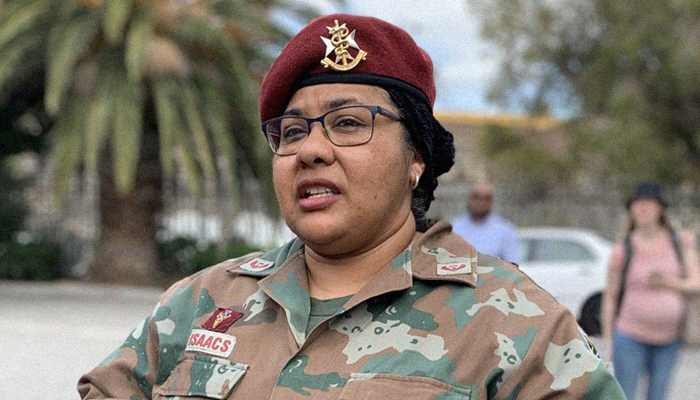Muslim women allowed to wear hijab on duty after brave officer challenges S African army in court
Major Fatima Isaacs, indicted for wearing a hijab under her military beret, took the army to South Africa's equality court
JOHANNESBURG: Muslim women in the South African army have been allowed to wear hijab, or headscarves, when on duty, a spokesperson confirmed on Thursday after a brave officer challenged the military in the country's equality court.
Earlier this week, the South African Defence Force (SANDF) agreed to amend its policy, allowing any Muslim women who chose to cover their heads while on duty to do so without repercussions.
Last year, in January, a military court dropped charges against Major Fatima Isaacs, an officer who had been indicted for wearing a hijab under her military beret.
'Criminally charged'
Major Isaacs was criminally charged in June 2018 with failing to obey lawful instructions and willful defiance after her superior asked her to remove her headscarf when in uniform.
In a statement, the South Africa-based Legal Resources Centre, which represented Isaacs, said the officer had been "criminally charged with three counts of contravening section 19(1) of the Military Discipline Code: disobeying lawful commands or orders".
A military court at the Castle of Good Hope near Cape Town withdrew all charges in January 2020, allowing Isaacs to exceptionally wear a tight black headwrap on duty as long as it did not cover her ears.
However, the South African army did not amend its dress policy — officially known as the "Amendment No 5: Wearing of Religious and Medical Adornments by SANDF Members in Uniform (2002) (Religious Dress Policy)" — prompting Isaacs to mount a challenge in South Africa's equality court.
"The SANDF dress regulation was updated to allow the wearing of headscarves by Muslim (women) according to stipulations in the dress regulations," spokesperson Mafi Mgobozi told AFP via WhatsApp on Thursday.
Equality court case withdrawn
The Legal Resources Centre welcomed the decision via Twitter on Wednesday and said it was withdrawing the equality court case.
It consequently "filed a Notice of Withdrawal in the Equality Court" and "will therefore not be pursuing this matter further as the current SANDF policy no longer discriminates against Muslim women in the military".
-
Police officer arrested over alleged assault hours after oath-taking
-
Maxwell seeks to block further release of Epstein files, calls law ‘unconstitutional’
-
Trump announces he is sending a hospital ship to Greenland amid rising diplomatic tensions
-
Trump announces a rise in global tariffs to 15% in response to court ruling, as trade tensions intensify
-
Savannah Guthrie mother case: Police block activist mom group efforts to search for missing Nancy over permission row
-
Shawn Levy recalls learning key comedy tactic in 'The Pink Panther'
-
Sarah Pidgeon explains key to portraying Carolyn Bessette Kennedy
-
Inside Nicole 'Snooki' Polizzi's 'private' marriage with husband Jionni LaValle amid health scare













